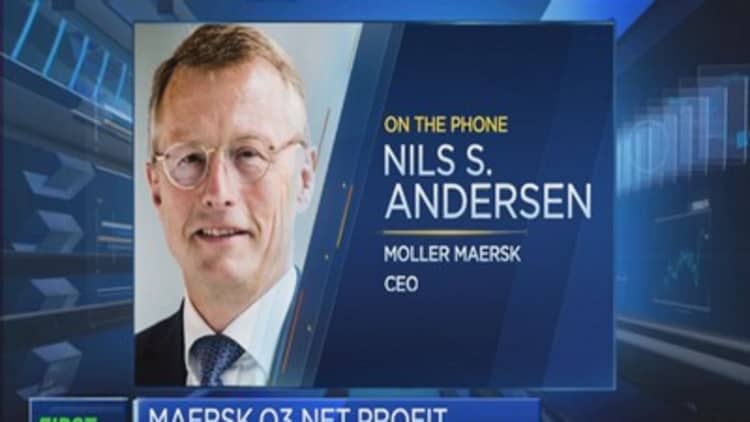
Danish shipping and oil giant Moller-Maersk is in "great shape" but is operating amid a "very tough" environment, the company's chief executive told CNBC, after the company reported a sharp drop in third quarter profits compared to last year.
His comments come after the company reported on Friday a third-quarter net profit in line with analysts' forecasts and repeated its full-year profit guidance given two weeks ago.
Net profit fell to $778 million, slightly above an average forecast of $764 million in a Reuters poll of analysts.
"What's led to the poor results in the last quarter is that we're competing in markets in which the oil price is down 50 percent and freight volumes are growing slower than expected and (freight) rates are down 19 percent."
"So it's bit tough out there but the business is doing well and we will post a profit for the full year of $3.4 billion which, I think, given the circumstances, is absolutely acceptable."
Read More 'We don't want others to leapfrog us': Maersk CEO
On October 23, the group cut its full-year net profit outlook to $3.4 billion from a previous forecast of $4.0 billion. Those expectations were repeated on Friday.
Andersen said he was getting used to the volatility. "We're fighting as well as we can and competing extremely well in the markets we're in."
He said there was little the company could do to mitigate the effect of difficult conditions in the shipping industry and the lower oil price, which has fallen to around $50 a barrel from a height of $114 last June.
"Then if you take the shipping environment, this is very volatile, but the average rate was $500 per container below (the amount) last year, and that gives us a negative impact on turnover of $1.2 billion."
Overcapacity has been another bugbear of the shipping industry with companies over-ordering new ships during the good times only to regret it amid a global slowdown and decline in demand and freight rates.
"For sure, we as a company have had an increase in the capacity compared to last year, so we have a bit of overcapacity now and we have tried to eliminate that because when the prices are really poor the upside of having additional capacity is close to zero...We hope we can get higher rates but we're also very determined to keep our market share and we'll fight for that."
- Reuters contributed reporting to this story.


